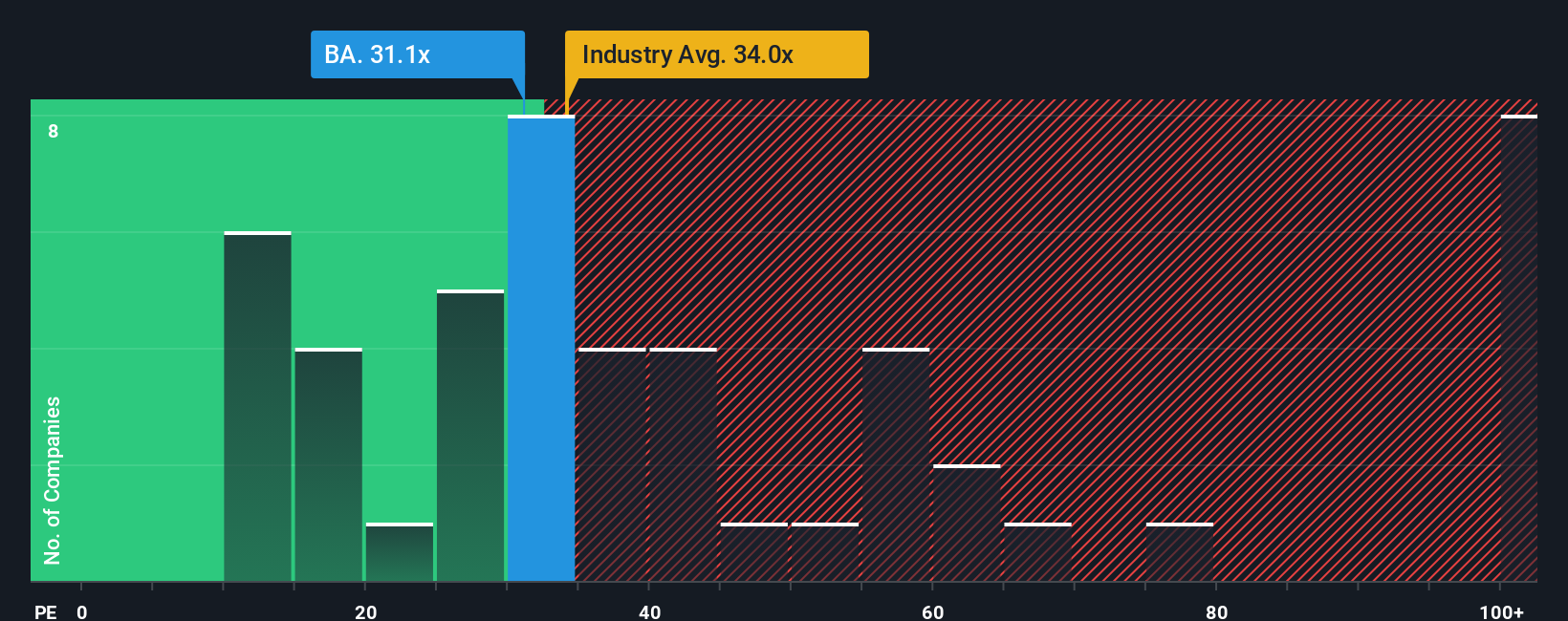- United Kingdom
- /
- Aerospace & Defense
- /
- LSE:BA.
Risks To Shareholder Returns Are Elevated At These Prices For BAE Systems plc (LON:BA.)
With a price-to-earnings (or "P/E") ratio of 31.1x BAE Systems plc (LON:BA.) may be sending very bearish signals at the moment, given that almost half of all companies in the United Kingdom have P/E ratios under 16x and even P/E's lower than 10x are not unusual. Although, it's not wise to just take the P/E at face value as there may be an explanation why it's so lofty.
With earnings growth that's superior to most other companies of late, BAE Systems has been doing relatively well. It seems that many are expecting the strong earnings performance to persist, which has raised the P/E. If not, then existing shareholders might be a little nervous about the viability of the share price.
View our latest analysis for BAE Systems

Does Growth Match The High P/E?
There's an inherent assumption that a company should far outperform the market for P/E ratios like BAE Systems' to be considered reasonable.
If we review the last year of earnings growth, the company posted a worthy increase of 8.0%. The latest three year period has also seen an excellent 52% overall rise in EPS, aided somewhat by its short-term performance. So we can start by confirming that the company has done a great job of growing earnings over that time.
Looking ahead now, EPS is anticipated to climb by 13% per year during the coming three years according to the analysts following the company. With the market predicted to deliver 15% growth each year, the company is positioned for a comparable earnings result.
With this information, we find it interesting that BAE Systems is trading at a high P/E compared to the market. It seems most investors are ignoring the fairly average growth expectations and are willing to pay up for exposure to the stock. Although, additional gains will be difficult to achieve as this level of earnings growth is likely to weigh down the share price eventually.
The Bottom Line On BAE Systems' P/E
Using the price-to-earnings ratio alone to determine if you should sell your stock isn't sensible, however it can be a practical guide to the company's future prospects.
We've established that BAE Systems currently trades on a higher than expected P/E since its forecast growth is only in line with the wider market. When we see an average earnings outlook with market-like growth, we suspect the share price is at risk of declining, sending the high P/E lower. Unless these conditions improve, it's challenging to accept these prices as being reasonable.
It's always necessary to consider the ever-present spectre of investment risk. We've identified 1 warning sign with BAE Systems, and understanding should be part of your investment process.
Of course, you might also be able to find a better stock than BAE Systems. So you may wish to see this free collection of other companies that have reasonable P/E ratios and have grown earnings strongly.
Valuation is complex, but we're here to simplify it.
Discover if BAE Systems might be undervalued or overvalued with our detailed analysis, featuring fair value estimates, potential risks, dividends, insider trades, and its financial condition.
Access Free AnalysisHave feedback on this article? Concerned about the content? Get in touch with us directly. Alternatively, email editorial-team (at) simplywallst.com.
This article by Simply Wall St is general in nature. We provide commentary based on historical data and analyst forecasts only using an unbiased methodology and our articles are not intended to be financial advice. It does not constitute a recommendation to buy or sell any stock, and does not take account of your objectives, or your financial situation. We aim to bring you long-term focused analysis driven by fundamental data. Note that our analysis may not factor in the latest price-sensitive company announcements or qualitative material. Simply Wall St has no position in any stocks mentioned.
About LSE:BA.
BAE Systems
Provides defense, aerospace, and security solutions in the United States, the United Kingdom, the Middle East, Australia, Japan, Europe, and internationally.
Undervalued average dividend payer.
Similar Companies
Market Insights
Community Narratives



